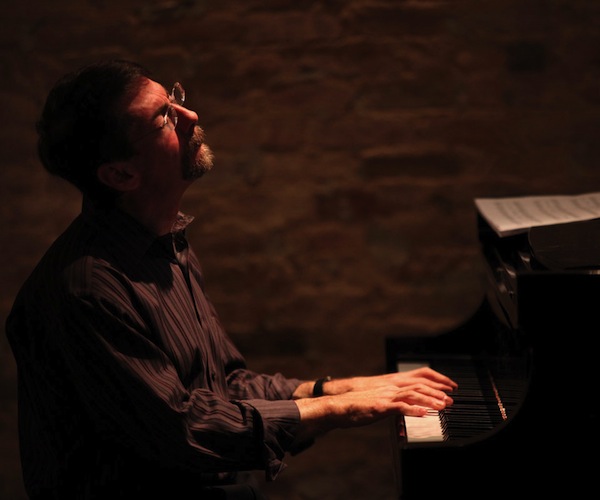Fuse Concert Review: Pianist Fred Hersch and Guitarist Julian Lage — A Sublime Duo
The set was thrilling, full of the most intelligent byplay, and consistently songful. Chamber music doesn’t get any better than this.

Pianist Fred Hersch — He writes airy, memorable pieces whose complications never seem to compromise their lyricism.
By Michael Ullman
At one point during the first set at Scullers’ on Thursday night, during a set designed to celebrate his new duet disc Free Flying (see Arts Fuse review), pianist Fred Hersch pointed out the difficulty of piano-guitar duets. Somehow it works with Julian Lage, he said. It works sublimely, he might have added. Hersch’s expansive two–handed style creates some of the challenge: what can Lage fit in? Rather than comp or play rhythm behind the pianist, the 25 year-old guitarist offers vivid commentary, even counter-examples. On their encore number, Duke Ellington’s “Things Ain’t What They Used to Be”…first recorded, amusingly enough, as “Time’s A-Wasting”…Hersch and Lage played the blues simply and with restraint. Then Hersch in his solo went far outside the normal harmonic range of the blues, generating long lines that eschewed every blues cliché and yet sill illuminated the piece. Then Lage went one step further by interjecting a jangling counter-point that was equally edgy in terms of harmony and tone.
It was the brilliant end of an evening that, besides featuring pieces Hersch wrote for the disc Free Flying, began with a poignant rendition of saxophonist Sam River’s famous ballad, “Beatrice,” which was named after his wife, and introduced a new piece -he called it a world premiere — with the working title “12 Minute Waltz.” The pianist writes airy, memorable pieces whose complications never seem to compromise their lyricism. The soaring lines of his “Song Without Words: Duet” were, despite its title, written for solo piano: the idea was that his fingers would answer each other. Those fingers are found in an active conversation from the beginning, with Lage poking in a few bass lines, and, intuitively, it would seem, mimicking some of Hersch’s improvised phrases. Lage played lines in what I am tempted to call a wine-dark tone that stood out beneath Hersch’s midrange: often, though, they played elaborate interactive games in the mid-range.
Lage’s solo on “Stealthiness,” dedicated to master guitarist Jim Hall, was another thing entirely: a series of complex chord sequences that evoked the latter’s harmonic mastery without mimicking his charming reticence. Hersch played a world premiere of a piece dedicated to his mom and grandmother: “West Virginia Rose.” It seemed almost unfinished, and led into his country/funky piece “Down Home,” which included something that verged on stride piano, with Lage providing, comically, prancing offbeats. Some of the pieces, performed live, were more restrained than what we heard on disc: on others, such as “Tango,” the two just let go. The set was thrilling, full of the most intelligent byplay, and consistently songful. Chamber music doesn’t get any better than this.
Michael Ullman studied classical clarinet and was educated at Harvard, the University of Chicago, and the U. of Michigan, from which he received a PhD in English. The author or co-author of two books on jazz, he has written on jazz and classical music for The Atlantic Monthly, The New Republic, High Fidelity, Stereophile, The Boston Phoenix, The Boston Globe and other venues. His articles on Dickens, Joyce, Kipling, and others have appeared in academic journals. For over 20 years, he has written a bi-monthly jazz column for Fanfare Magazine, for which he also reviews classical music. At Tufts University, he teaches mostly modernist writers in the English Department and jazz and blues history in the Music Department. He plays piano badly.
